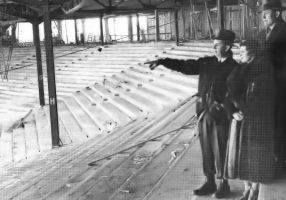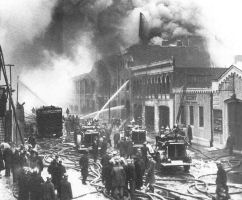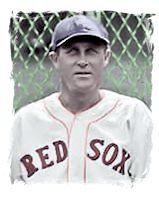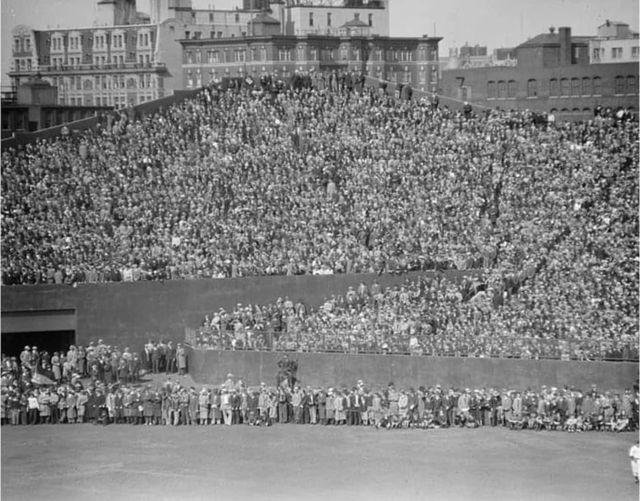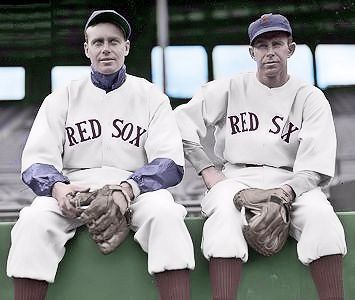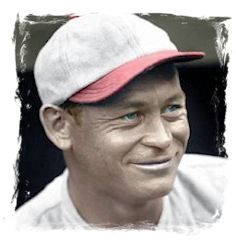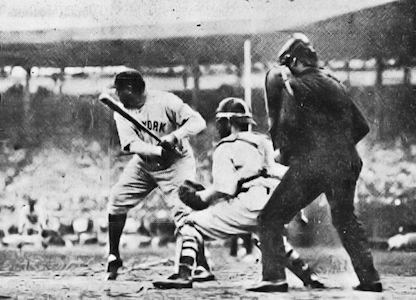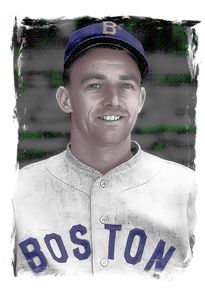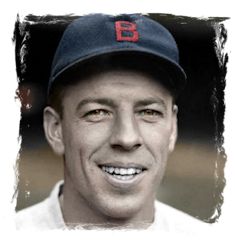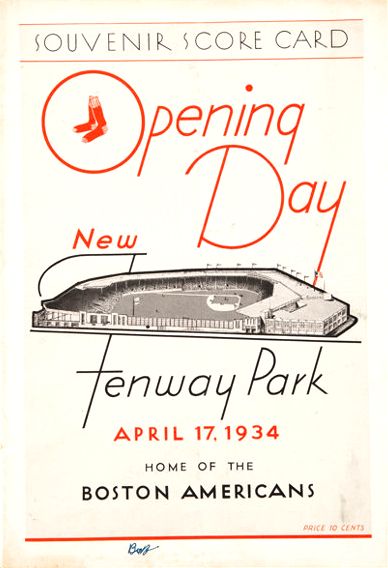1934 BOSTON RED SOX
...
Tom Yawkey saw the Red Sox most pressing need, was to replace the decaying ballpark. There were seats without bottoms, bird droppings on other seats. It was a beautifull ballpark that fell into disrepar and decay in just twenty years. Yawkey knew that if he didn't do something, the fans would have no reason to come to a game and see a second-rate team in a third rate setting. He was working on making the team better and he decided to give his customers the best place possible to see a ball game. He decided to spend $1.25 million in order to change the wooden fire hazard into a cement and steel masterpiece, that would become the most famous ballpark in baseball.
He worked with Osborne Engineering and decided to re-build the grandstand from third to first, putting in footings under a concrete base. There would be steel columns placed to support a second deck, in planning for a future expansion. He decided to put box seats in front of the grandstand, pushing home plate out to make room for them. The right field bleachers past the area now known as "Canvas Alley" were to be replaced and integrated into the new concrete grandstand. And the wooden bleachers in right-centerfield would be replaced with a separate concrete structure. The final piece of the puzzle was to remove "Duffy's Cliff" and build a concrete wall that would be blended into the third base grandstand and center field bleachers., It housed a new electric scoreboard with red and green lights for strikes, balls and outs. Large advertisement were also posted high up on the wall. The seating capacity when done, would be increased from 26,000 to 38,000. The final thing was to build a luxurious press box to insure that he would great rave reviews in the press. The construction cost was $500K. The project became more important to the citizens of Boston than it would be to the ballplayers. It was one of the largest construction projects undertaken during the "Great Depression". It gave jobs to 750 skilled union workers, who used 15,000 cubic yards of concrete, 550 tons of steel, 100,000 bricks, 8000 cu ft of sod and 500,000 feet of lumber. It became Yawkey's own WPA project for the city, paying money to hundreds of families.
Most of the construction had to start in the winter of 1934, because the Boston Redskins still had use of the existing park for their home games. Work began in December, but a four alarm fire on January 5th destroyed most of the work . Within days the workforce increased by another 300 men and then another fire broke out on February 19th. The fire department thought that both fires were set to prolong the project and keep the workers employed, but it was never proven. Following the two fires, legions of union laborers worked triple shifts, even bunking down in a two-story house built at the center of the infield. Work increased and the new Fenway Park was done in time for "Opening Day" on April 17th. On the field Yawkey and vice president Eddie Collins continued to purchase talent and make changes to improve the team. Yawkey took it upon his own to hire a family friend, Bucky Harris, to manage the team. Collins was angry at the decision, because he was not consulted and the two hated each other from their playing days. It created problems between the manager and the general manager, because Harris would by-pass Collins and meet with Yawkey when there was a problem. In September, Yawkey purchased Julius "Moose" Solters from Baltimore. Moose had primarily played center field for Baltimore but expressed no preference for one position or another. He was so confident in his ability to play major-league baseball that he reportedly signed a blank contract and was satisfied to let the Red Sox fix his salary in accordance with what we thought he was worth after seeing him win a regular place on the team. On September 5th, Yawkey bought rookie pitcher Fritz Ostermueller from the St. Louis Cardinals. On October 3rd, the Red Sox selected firstbaseman Ed Morgan from the New Orleans Pelicans in the Rule 5 draft. Morgan was recommended by Joe Judge, the Red Sox first baseman, who would be released in May. With Marty McManus gone, the Red Sox needed another infielder and dealt left-handed pitcher Lloyd Brown to the Indians for secondbaseman Bill Cissell on October 12th.
As work was going on at the ballpark over the winter, Yawkey and Collins were busy at the winter meetings in Chicago. A's owner Connie Mack was another owner that the Depression hit hard. He decided to break up his champion team because he needed the cash. On December 12th, he let Yawkey buy the best pitcher in baseball from him, Lefty Grove for $125K. Grove had gone 31-4 for the A's in 1931 and had won 172 games over the past seven seasons. He was the Sox first bona fide savior, the one who everyone thought would lead them out of the wilderness. Pitcher Rube Walberg and second baseman Max Bishop were also dealt by Mack for Rabbit Warstler, Bob Kline plus $150K. Walberg's favorite non-baseball activity was definitely hunting. He hunted often with teammate Mickey Cochrane and made one trip with Yawkey, to Wyoming. There they hunted big game, including antelope, elk, deer, brown bears, and grizzly bears. They also hunted ducks and geese and did some fly fishing. Carl Reynolds, a career .300 power hitter was traded to the Red Sox from the St. Louis Browns, for Ivy Andrews, Smead Jolley and cash, on December 14th. Along with Moose Solters and Roy Johnson, it gave the Red Sox their best outfield trio since Duffy Lewis-Tris Speaker-Harry Hooper. Pitcher Herb Pennock had developed a lifelong friendship with Collins while on the Aís, and he brought Pennock over as a free agent, for one more season in January. When camp opened in Sarasota, the Sox had a good pitching staff on paper. There was not one negative thing written about the team in the Boston newspapers. When Lefty Grove arrived he got a hero's welcome. On March 10th, he threw batting practice and four days later he threw again at half speed. Within two days his shoulder was sore. On April 4th, Grove staged his first full-blown temper tantrum. After warming up for fifteen minutes before a game with the Dodgers, he got frustrated, threw down his glove and stormed off the field. On April 7th, when he finally took the mound, he gave up eight hits and four runs in four innings and had nothing. With a sore left arm he would struggle all season. Bob Weiland was the same hard luck pitcher as he was in 1933. Rube Walberg was doing fine until mid-May when he stopped a hot line drive and was laid up for a month. Herb Pennock was only good for an inning or two in relief and the rookie Fritz Ostermueller appeared to be the only one who was dependable.
On April 17th, the "New" Fenway Park opened and the Red Sox hosted Washington. After the parade to the flagpole was dispensed with, a squad of marines from the Charlestown Navy Yard for the flag raising ceremony. Governor Ely threw out the opening pitch and a group of Royal Rooters presented manager Bucky Harris with a floral wreath. 30,336 fans made their way though the turnstiles and enjoyed a game that went into extra innings. The Sox rallied from a 5-0 deficit, but lost 6-5, in 11 innings.
The Red Sox swept a doubleheader from the Washington Nationals on April 19th. The Sox batters pounded the living daylights out of the visitors, banging out 23 hits for 41 bases. The Sox beat the Nats 5 to 4 in the morning and 7 to 3 in the afternoon. It was a ninth inning walk-off homer by Moose Solters that put the first game on ice. The second game was a slugfest against three Washington pitchers. Fritz Ostermueller made his big-league debut on April 21st, in a relief role in the fifth game of the season before the home folks at Fenway Park. The Yankees had a 6-5 lead when Fritz was summoned in the seventh inning with the bases loaded and two out. The rookie stymied the New Yorkers, recording seven outs, and the Red Sox rallied to win, 9-6, giving Ostey his first major-league victory. On April 22nd, the Yanks beat the Sox, 8-1. Herb Pennockís appearance in the ninth inning was the highlight, as Babe Ruth and Lou Gehrig were due up. In a circus-like atmosphere, he allowed back-to-back doubles. The Red Sox stopped off at Fitton Field in Worcester to play against Holy Cross in an exhibition game on April 23rd. Lefty Grove pitched five innings, gave up four hits and said he felt great. In Washington, Johnny Welch pitched a 5-0 shutout, allowing the Nats only five hits. Four straight singles netted the Sox all the runs they would need.
Hank Johnson allowed the Athletics only three scattered hits thru eight innings when he faced them at Fenway on May 1st. In the ninth they touched for a pair of runs however. The Sox won 7-2 behind Bucky Walters' two run jack over the wall. The next day the Sox found themselves on the losing side of a 12-11 slugfest against Philly. Down 12-9 going into the ninth the Sox rally fell short. The scored three runs on consecutive doubles by Carl Reynolds and Moose Solters. After Rick Ferrell popped up, Walters blasted another homer, to bring the Sox within one. But that was it for their bounce back. In another free-for-all against the Browns this time, the Sox outlasted their opponent, 13 to 12 on May 5th. Both Max Bishop and Reynolds collected for hits, with each knocking out a pair of doubles. The Sox were up 8-3 after three innings and Lefty Grove was brought in for his first appearance in a Red Sox uniform, to pitch the fourth inning. He walked the first batter, gave up three consecutive hits and walked the fourth batter, giving up five runs. There was no pain, but the great lefty had nothing. The Red Sox set a major-league record by scoring 12 times in an inning and hitting four consecutive triples against the Tigers on May 6th, winning 14 to 3. Reynolds had four hits in the last game including a double. This day he had two triples and a single in three times up, hitting safely seven times in succession. Solters, with three hits in five times up, including a pair of doubles, led the Sox against the Indians on May 10th in Cleveland. Unfortunately, the Sox were on the losing end in am 11-10 game. On May 11th, Yawkey gave the Yankees Fred Muller and $20K for shortstop, Lyn Lary. Gordon Rhodes won his fourth straight game on May 13th. The Chicago White Sox fell to the Red Sox 14 to 2 at Fenway. Two grandslam homers were struck by Walters and Ed Morgan. Walters knocked out a two-run homer later in the game also, along with a triple and a single. Lefty Grove got his first start and won his first game as a member of the Red Sox, on May 19th in St. Louis, 4 to 1. But he didn't have his famour blinding speed. After giving up the Browns' only run in the third inning, Grove launched a homer of his own, with two aboard, in the seventh inning. In Chicago on May 21st, in a offensive battle, the Red Sox scored three runs in the 10th inning to give themselves a 13-10 decision. Morgan banged out five hits including a three-run homer and Roy Johnson had four. The Cleveland Indians belted Grove for 10 hits on May 23rd, including a home run, a triple and four doubles, but the Sox hitters carried him to a 7 to 5 win. Morgan brought home three runs with two hits, while Roy Johnson doubled and homered. A pitch broke a bone in Soltersí left hand. He was hitting .326 at the time and didnít come back for a month.
After the Red Sox pitchers gave up 24 hits in an 18-3 rout by the Cleveland Indians on May 25th, Eddie Collins went to see Indians general manger Billy Evans about obtaining pitcher Wes Ferrell, the brother of the Sox catcher, Rick Ferrell. Wes had been a four-time twenty game winner for Cleveland, had been a spring salary hold out because the Indians wanted him to take a cut in pay, and was suspended by the team. The Indians were happy to trade him and a trade was agreed upon for Ferrell and outfielder Dick Porter in exchange for pitcher Bob Weiland, outfielder Bob Seeds, and $25,000 in cash. Gordon Rhodes held the A's to five scattered hits in the second game of a May 30th doubleheader in Philadelphia. The Sox won 2 to 1, coming off a 2-1 two hitter by Johnny Welch, the day before. The Sox concluded the month of May in 6th place, 5 1/2 games behind.
On June 1st, with Lefty Grove scheduled to start, the Red Sox scored nine runs in the top of the first inning at Washington and Herb Pennock (who had batted in the top of the first) was put on the mound. He finished with a complete game, nine-hitter, his final career win, by a score of 13-1. Ed Morgan, Roy Johnson and Carl Reynolds each had four hits. In his next start, Grove was on the losing end of a 2-1 pitchers duel in the first game of a June 2nd doubleheader. He gave up 10 hits but was able to work his way of most jams. The second game saw the Sox explode for six runs in the top of the 12th inning, beating Washington 10-7. Wes Ferrell's first Red Sox appearance was on June 5th, when he shut down the New York Yankees, 8 to 3 with 5 2/3 innings of two-hit pitching, coming in to relieve Gordon Rhodes. Fritz Ostermueller was a one-man show for the Red Sox on June 8th. Not content with silencing the Washington sluggers in all but one inning of a 12 inning game, he started the Sox on the rally that won the game, giving his team a 3-2 decision. Ferrell, in his first starting assignment as a member of the Red Sox, not only pitched a masterful game, but drove in the winning run, after two were out in the ninth inning, as the Red Sox defeated Washington, 4 to 3, on June 10th. The Red Sox had an eight run inning against the Tigers on June 14th, winning 15 to 13. Billy Werber and Roy Johnson each had three hits. Lefty Grove came in to relieve Johnny Welch in the fourth inning, but was knocked out after Detroit kicked him around for 15 hits and eight runs. He wouldn't pitch again until July. Lyn Lary doubled high off the left field wall in the bottom of the ninth inning, bringing home Dick Porter with the walk-off winning run, and giving the Sox a thrilling 3-2 victory over the St. Louis Browns on June 16th.
On June 18th the Sox swept a doubleheader from the Browns at Fenway. Dick Porter had a field day, going 4-for-4 in the second game with three RBIs and 2-for-4 in the opener. The Sox won the game 14-9 and took the first game 6-5. The highlight was a play made by St. Louis firstbaseman Jack Burns. He chased a foul pop toward the Red Sox dugout and slipped on the collection of bats that were spread out on the ground as common practice. He tumbled into the dugout but still managed to catch the pop-up for an out. Bill Cissell, Roy Johnson and Porter each accounted for three hits apiece, in a 14-9 win over the Chicago White Sox at Fenway on June 20th. Fritz Ostermueller scattered nine hits and gave up a single run as the Red Sox clobbered the White Sox 11-1, in the fourth game of the series. 10-2 was the score in the fifth game, with Boston taking four games of the five game series. In the five games the Red Sox racked up 45 runs, an average of nine runs per game. Johnson had 13 hits in 29 plate appearances, for a .448 series batting average. Hosting the Cleveland Indians on June 27th, Hank Johnson pitched one of the best games of the season, shutting out the Tribe, 6 to 0, three-hitter. He struck out eight and walked only one batter. The Red Sox posted an 18-11 winning record for the month, finishing 6 1/2 games out of first, in fourth place.
A two-run jack by Roy Johnson in the 11th inning with Ed Morgan aboard at Yankee Stadium, put the Sox ahead of the Yankees, 10 to 9 on July 3rd. Lefty Grove pitched two inning of ineffective relief and returned to Boston. Ostermueller had memorable moments in his rookie year, including a Fourth of July triumph over the Yankees in relief of Wes Ferrell. Taking over in the fifth with bases loaded, no outs and the Red Sox clinging to a tenuous, 5-4 lead, he walked the first batter to tie the score but shut out New York the rest of the way and the Sox rallied to win, 8-5. Wes came off the bench to pinch hit and slugged a double with one out in the ninth inning, that scored two runs and gave the Red Sox a come from behind 11-10 walk-off win on July 7th. On July 8th, Max Bishop walked eight times in the doubleheader at Fenway, tying his own major-league record. The Sox swept the Philadelphia A's, winning four of the five games played in the series. The All Star Game was played on July 10th at the Polo Grounds. The American Leaguers won 9-7, but it was lefty pitcher, Carl Hubbell of the Giants, who was the star of the game. He struck out Babe Ruth, Lou Gehrig, Jimmie Foxx, Al Simmons and Joe Cronin in succession. Rick Ferrell was the Red Sox representative, but did not get in the game. Lefty Grove stayed home for the first time. He was no longer the best left-handed pitcher in baseball. The Sox resumed their schedule in St. Louis on July 13th, beating the Browns 7-2. Wes Ferrell was the whole show, not only hurling a great game, shutting out the Browns until the ninth inning, but also walloping two tremendous home runs, each with a man on base. Billy Werber doubled and homered, going 4-for-5 in the first game of a July 15th doubleheader in St. Louis, winning 12-8. Bill Cissell had a great day in Chicago. On July 18th, he knocked in seven runners with two doubles and a home run. The Red Sox beat the White Sox 16 to 3. Roy Johnson was having a great year, batting .340 on July 21st. He took his hot bat into Cleveland on July 21st and had a homer and a pair of doubles in four plate appearances, leading his Red Sox to a 7-6 win. The Sox were down 6-3 going into the 8th inning, when they erupted for four runs to grab the lead. On July 24th Lefty Grove pitched two innings in Detroit. He gave the Tigers a run by walking a batter, wild-pitching him to second and giving up a single. The Sox lost 6-3. Wes Ferrell had a 8-1 record and was handed a 6-0 lead, when he took the mound in the second inning during a game in Detroit on July 25th. When the inning was over, Ferrell had been knocked out and the Tigers had tied the game. But the Sox didn't quit. In the ninth inning Roy Johnson came to the plate with Bill Cissell on second. He blasted a double that scored Cissell with the eventual winning run, beating Detroit 9 to 7. Ferrell bounced back by shutting out Washington 8 to 0. So strong was Wes, that the Nats did not get a runner to third until the ninth inning.
On July 31st at Yankee Stadium, Ostermueller gave up Babe Ruthís 703rd career home run as New York triumphed, 2-1. Older by two years, Rick Ferrell displayed a quiet, mild-mannered temperament while Wes Ferrell could be brash and outspoken. Rick was a model teammate, a leader by example, considerate and helpful to others. Wes was a hothead, at times, acting impulsively out of frustration and a strong desire to win. In a game against Philadelphia on August 8th, Wes took the mound in the bottom of the third inning with a 10Ė1 lead but then proceeded to give up six runs on a pair of homers. When Bucky Harris, came out to relieve him, he refused to hand over the ball. When he was finally persuaded to return to the dugout he punched himself in the jaw with his fist and slammed his head against a concrete wall. He had to be forcibly restrained to prevent him from doing further harm to himself. After a five week layoff, Lefty Grove took over and held the A's to six hits, two runs and no walks for 6 1/3 innings. Babe Ruth socked another round-tripper off Fritz on August 11th at Fenway (No. 705), but in a losing cause, as Ostey pitched all the way, to record a 13-inning, 3-2 victory. Wes' pinch hit single finally put across the deciding run in the 13th inning. It was Ruthís last season as a Yankee and Fritz struck him out in the first inning. He rewarded the rookie left-hander with an autographed baseball after the game.
Close to 46,800 came to Fenway to see Babe in his final appearance as a Yankee. For the unprecedented occassion, twenty extra police, forty firemen and 160 ushers were hired. Forty five extra cars were add to the railway and buses had to be re-routed away from Kenmore Square. Babe gave a tear-eyed farewell speech and played both games of the doubleheader on August 12th, but didn't homer. He doubled in the first game and was passed three times in the afternoon game. On August 14th, in support of Lefty Grove, who got his first start in over two months against the Browns, Rick Ferrell tripled and doubled and was robbed of another hit by a great catch. A triple by Roy Johnson put over two runs and Grove had a 7-3 win, only his sixth of the season. Carl Reynolds went 4-for-4 in the next game, leading the Sox to a 6-2 win. On August 17th, Wes Ferrell (11-2) dominated the Browns in the first game of a doubleheader. He held St. Louis batters to just two singles and walked only one, shutting them out 6-0. On August 19th, Lefty Grove faced General Crowder in the first game of a doubleheader with the first place Tigers. Almost 50,000 fans flocked to Fenway. Some wanted to see the Tigers, some wanted to see the two pitchers, and some wanted to cheer local hero, Mickey Cochrane. Grove gave up all eight runs in five innings and the Sox lost 8-6. Wes made a complete job of beating the Chicago White Sox at Fenway, by a score of 3 to 2 in 10 innings on August 22nd. He tied the score in the eighth inning when, with one out and nobody on, sent a shot over the left field wall, making it 2 to 2. Then in the 10th inning, after two were out, he slugged another home run and jogged home with the walk-off game winner.
Rookie George Hockette, in his first major league appearance, took the mound for the Red Sox in St. Louis on September 17th. He had a no-hitter going until two were out in the eighth inning when Frank Grube of the Browns lined a single to left. Ollie Bejma got a hit in the ninth for another Browns hit. Hockette won the game 3-0, giving up only those two hits and one free pass.
The next day, on September 18th, Bobo Newsome of the Browns threw a no-hitter against the Sox for nine innings, but lost the game 2 to 1 in the 10th inning. Two bases on balls and a single from Roy Johnson after two were out bought a Red Sox win. The Sox had scored an unearned run on an error, an intentional pass and a ground out for their first run. A 5-0 shutout by Sox rookie pitcher John Merena, knocked the New York Yankees out of the American League pennant race, giving the title to the Detroit Tigers on September 24th. But for a bucket kick, Billy Werber might reside in the Hall of Fame rather than be remembered as just a good major-league ballplayer of the 1930s. Toward the end of the season, in September, he was playing third base and leading the league in batting average, steals, and runs scored. In the days before air conditioning, teams kept a bucket full of ammonia water in the dugout so that players could sponge off. Lefty Grove had a habit of kicking the bucket and sending water flying everywhere after a bad inning on the mound. The team, unbeknownst to Billy Werber, had replaced the bucket with a heavier one with iron bands, to discourage Grove from taking out his frustrations. One this afternoon Werber, who had a bit of a temper himself, popped up with men on base and proceeded to attack the bucket with the front of his foot. The result was a broken toe on his right foot.
The Sox had one player to cheer about. After his untimely bucket kick, Werber was on the way to an MVP season. He till finished with a .321 batting average in 152 games, leading the league with 40 stolen bases and pounding out 200 hits and scoring 129 runs. Lyn Lary hit .241 but drew a good number of bases on balls (66) and had an on-base percentage of .344 but his .965 fielding percentage led all shortstops in the American League. Secondbaseman Bill Cissell hit .267, just slightly below the teamís .272 average, and drove in 44 runs, though he did rank last in RBIs among the starting position players. The Red Sox had a potent outfield. Roy Johnson was their best player and had his best season, batting .320 with 119 RBIs (sixth in the league). Moose Solters played in 101 games and batted .299. Carl Reynolds had a good year also, though he appeared in only 113 games. He kept his average over .400 for a full month early in the season, and wound up hitting for a .303 average and driving in 86 runs. Rick Ferrell led all American League catchers with a .990 fielding average in 128 games and had been selected for the All-Star team again. Wes Ferrell played in an era when good-hitting pitchers were not as unusual as they are today. But even by the standards of that time he stood out for his solid work at the plate, in particular his power and his ability to come through in the clutch, often as a pinch hitter. In 78 at bats, he batted .282 and hit four homers. Inconsistent pitching became the trademark of the 1934 Sox. The former best pitcher in baseball, Lefty Grove pitched injured throughout the year and went 8-8 with a 6.50 ERA, winning only two of his last five decisions. It was a sad year for a very proud man. At the end of his disappointing season, Connie Mack offered to give Yawkey his money back. Wes Ferrell pitched the way they expected Grove to pitch. He had a 14-5 record, a 3.63 ERA and was the Sox best pitcher. Gordon Rhodes had a record of 12-12 and a 4.56 ERA and Johnny Welch was 13-15 with a 3.63 ERA. Fritz Ostermueller finished at 10-13, but he led Red Sox starters with a 3.49 ERA, seventh best in the American League. The Red Sox limped into fourth place at 76-76. Largely replacing bad players with average players, they had made an improvement of 13 games and established a record 610,640 in home attendance. To some sportswriters, Lefty Grove was the whole sad story. But within the game and the media, the Red Sox however, had become relevant.
|

